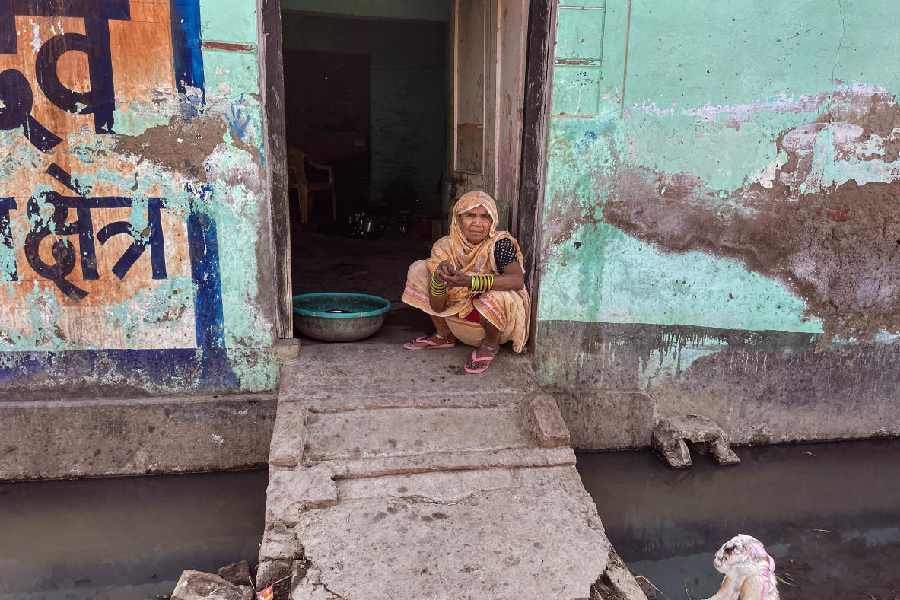In the rural expanse of western Uttar Pradesh's Hathras and Firozabad, where the pastoral beauty belies deep-seated challenges, those living in Dalit colonies want basic necessities and dignity and freedom from filth and sewage.
Several villages this PTI reporter visited had a Dalit colony separately and these villages had debilitating homes and sanitation issues.
In these villages, the realities of sanitation and poverty shape the narratives of women like Aarti Devi and Maya, whose voices echo the aspirations and frustrations of their communities.
In Hathras's Pilakhana, the air is heavy with the stench of stagnant water that surrounds modest homes, many of which are precariously perched in disrepair.
For Aarti Devi, a Dalit woman whose days are consumed by cleaning the households of so-called upper caste people, her own living conditions are in stark contrast with the cleanliness she strives to achieve elsewhere.
"Our houses are swallowed by filth and sewage. We clean the homes of others, but our own lives are submerged in dirt. Where is swachhta (cleanliness) here," asked Devi, apparently referring to the government's Swachh Bharat campaign.
She manages to earn only about Rs 3,000 every month by working in four households and is the sole breadwinner in her family.
For her, elections are an opportunity to at least be vocal about her struggles and have some power.
"At least party workers come and look at our state and at times our problems are also addressed right before the polls so we look forward to the assembly and Lok Sabha polls," she said.
She is indecisive of whom to vote.
"We gave this government absolute power – in Centre and in state – but still nothing beneficial came our way and the situation has further only worsened," she said.
Devi's story resonates across the Dalit enclaves in Hathras and Firozabad, where women like Pushpa from Hathras's Akrabad find themselves caught in a cycle of poverty exacerbated by societal barriers.
"We barely earn enough to feed our children but even then we vote as our husbands say. Despite this being a SC reserved constituency we continue to be deprived," she said.
In the villages, the promise of government schemes like the PM Awas Yojna remains unfulfilled for many.
Half-built houses stand as monuments to unmet expectations, awaiting the next installment that never arrives.
Maya from Hathras's Jafrabad reflects on this with a sense of yearning for change.
"We want more than empty promises. We need leaders who see us, who understand our struggles," she said.
As the Lok Sabha polls approach, the atmosphere is charged with a collective longing for recognition and transformation.
In Kodiaganj, Laxmi's voice carries the weight of her community's aspirations "We want clean water, proper roads. We want to live with dignity. Is that too much to ask," she said.
Even amid the labyrinthine lanes of Jafrabad and Gonch, where broken homes mirror broken promises, the hope for meaningful change persists.
The women of these villages embody a yearning for more than mere survival - they seek recognition and agency in a society that often overlooks their plight.
Kiran, from Firozabad's Kheri Kalan, articulates this sentiment with conviction.
"It has been decades and we still live in Dalit colonies separately from the rest of the village and we are landless and there is nothing else to do than work in households or farms of upper castes in the village," she said.
Both Hathras and Firozabad go to polls on May 7. Hathras, a rural constituency, has 658 villages while Firozabad is a primarily rural district, with 66.6 per cent of the population living in rural areas and 33.4 per cent living in urban areas as of 2011.
Both the constituencies are seeing a triangular fight among SP, BJP and BSP. In SC-reserved Hathras, Uttar Pradesh minister Anoop Pradhan Balmiki is BJP's candidate while Samajwadi Party has fielded Jasveer Valmiki and the BSP fielded Hembaboo Dhangar.
In Firozabad, SP has fielded former chief minister Akhilesh Yadav's cousin Akshay Yadav against BJP's Vishwadeep Singh. BSP has fielded Chowdhary Basheer.
Except for the headline, this story has not been edited by The Telegraph Online staff and has been published from a syndicated feed.











